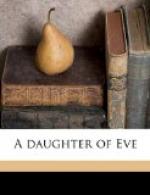During the last days of autumn Marie and Raoul again met and renewed their walks in the Bois, where alone they could see each other until the salons reopened. But when the winter fairly began, Raoul appeared in social life at his apogee. He was almost a personage. Rastignac, now out of power with the ministry, which went to pieces on the death of de Marsay, leaned upon Nathan, and gave him in return the warmest praise. Madame de Vandenesse, feeling this change in public opinion, was desirous of knowing if her husband’s judgment had altered also. She questioned him again; perhaps with the hope of obtaining one of those brilliant revenges which please all women, even the noblest and least worldly,—for may we not believe that even the angels retain some portion of their self-love as they gather in serried ranks before the Holy of Holies?
“Nothing was wanting to Raoul Nathan but to be the dupe he now is to a parcel of intriguing sharpers,” replied the count.
Felix, whose knowledge of the world and politics enabled him to judge clearly, had seen Nathan’s true position. He explained to his wife that Fieschi’s attempt had resulted in attaching to the interests threatened by this attack on Louis-Philippe a large body of hitherto lukewarm persons. The newspapers which were non-committal, and did not show their colors, would lose subscribers; for journalism, like politics, was about to be simplified by falling into regular lines. If Nathan had put his whole fortune into that newspaper he would lose it. This judgment, so apparently just and clear-cut, though brief and given by a man who fathomed a matter in which he had no interest, alarmed Madame de Vandenesse.
“Do you take an interest in him?” asked her husband.
“Only as a man whose mind interests me and whose conversation I like.”
This reply was made so naturally that the count suspected nothing.
The next day at four o’clock, Marie and Raoul had a long conversation together, in a low voice, in Madame d’Espard’s salon. The countess expressed fears which Raoul dissipated, only too happy to destroy by epigrams the conjugal judgment. Nathan had a revenge to take. He characterized the count as narrow-minded, behind the age, a man who judged the revolution of July with the eyes of the Restoration, who would never be willing to admit the triumph of the middle-classes—the new force of all societies, whether temporary or lasting, but a real force. Instead of turning his mind to the study of an opinion given impartially and incidentally by a man well-versed in politics, Raoul mounted his stilts and stalked about in the purple of his own glory. Where is the woman who would not have believed his glowing talk sooner than the cold logic of her husband? Madame de Vandenesse, completely reassured, returned to her life of little enjoyments, clandestine pressures of the hand, occasional quarrels,—in short, to her nourishment of the year before, harmless in itself, but likely to drag a woman over the border if the man she favors is resolute and impatient of obstacles. Happily for her, Nathan was not dangerous. Besides, he was too full of his immediate self-interests to think at this time of profiting by his love.




